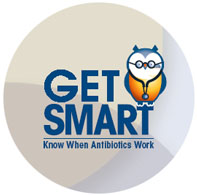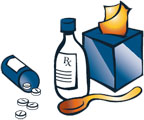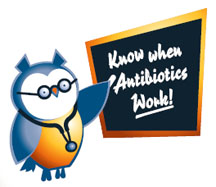 Print-friendly color version (PDF 394 KB) Print-friendly color version (PDF 394 KB)
 Print-friendly black & white version (PDF 137 KB) Print-friendly black & white version (PDF 137 KB)
For Parents
Snort. Sniffle.
Sneeze.
No Antibiotics
Please. |
 |
When your child is sick, you want to do everything you can to help. But antibiotics are not the answer for every illness. This brochure will help you know when antibiotics work – and when they won’t. For more information, talk to your doctor or visit www.cdc.gov/drugresistance/community.
The Risk: Bacteria Becomes Resistant |
 What’s the harm in giving your child antibiotics anytime? Taking antibiotics when they are not needed can cause some bacteria What’s the harm in giving your child antibiotics anytime? Taking antibiotics when they are not needed can cause some bacteria
to become resistant to the antibiotic.
These resistant bacteria are stronger and harder to kill. They can stay in your child’s body and can cause severe illnesses that can’t be cured with antibiotic medicines. A cure for resistant bacteria may require stronger treatment – and possibly a stay in the hospital.
To help prevent antibiotic resistance, the Centers for Disease Control and Prevention\ recommends giving your child antibiotics only when necessary.
|
Antibiotics Aren’t Always the Answer |
Protect Your Child,
Give the Best Care |
|
Antibiotics should not be used to
treat the common cold, runny noses
and most coughs. Children fight off
these viral illnesses on their own.
If your child’s doctor or health care provider prescribes an antibiotic to treat a bacterial infection – like strep throat – be sure to give your child all of the medicine. Only using part of the prescription means that only part of the infection has been treated. Not finishing the medicine
Talk to Your Doctor or Nurse
to Learn More |
|
|
Most illnesses are caused by two kinds of germs: bacteria and viruses. Antibiotics can cure bacterial infections – not viral infections.
Bacteria cause strep throat, some pneumonia and sinus infections. Antibiotics can work.
Viruses cause the common cold, most coughs and the flu. Antibiotics don’t work.
Using antibiotics for a virus:
- Will NOT cure the infection
- Will NOT help you feel better
- Will NOT keep others from catching your illness
|
Commonly Asked Questions:
How Do I Know if My Child has a Virus or a Bacterial Infection?
Ask your child’s doctor or health care provider and follow his or her advice on what to do about your child’s illness.
Remember, colds are caused by viruses and should not be treated with antibiotics.
Does This Mean I Should Never Give My Child Antibiotics?
Antibiotics are very strong medicines and should be used to treat bacterial infections.
Your doctor or health care provider will prescribe antibiotics if your child has a?
bacterial infection.
If Mucus from the Nose Changes from Clear to Yellow or Green — Does This Mean That my Child Needs an Antibiotic?
Yellow or green mucus does not mean that your child has a sinus infection. It is normal for the mucus to get thick and change color during a viral cold.


| GET SMART... |
- Antibiotics are strong medicines, but they don’t cure everything.
- When not used correctly, antibiotics can actually be harmful to your health.
- Antibiotics can cure most bacterial infections. Antibiotics cannot cure viral illnesses.
- Antibiotics kill bacteria – not viruses.
- When you are sick, antibiotics are not always the answer.
|
USE ANTIBIOTICS WISELY.
Talk with your doctor or health care
provider about the right medicines for your health.
For more information, see the Centers for Disease Control and Prevention Web site at:
http://www.cdc.gov/getsmart
|